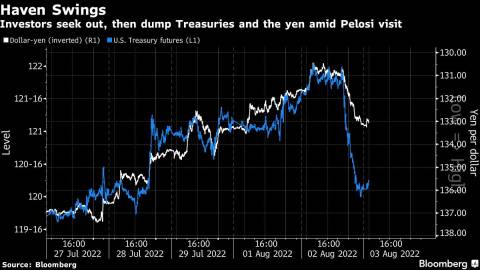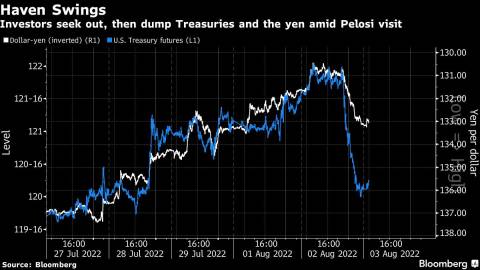(Bloomberg) -- From an accelerated decoupling of the world’s two largest economies to a discussion on whether China might weaponize its vast holding of Treasuries, strategists are outlining how US House Speaker Nancy Pelosi’s Taiwan trip may ripple across global markets.

Haven assets whipsawed overnight as concerns about the level of military response from China dissipated and Treasuries sold off on hawkish comments from Federal Reserve officials. The yen saw an abrupt turnaround, sinking more than 1% after its strongest four-day run since 2020 and benchmark US yields jumped 18 basis points. Stocks remained under pressure.

Pelosi’s visit is fanning fresh jitters among investors already spooked by the threat of a global slowdown amid surging inflation. Escalating tensions between China and the US risk eating into already fragile sentiment, giving a boost to havens like the dollar and yen and weighing on equities.
Here’s a selection of comments from analysts and strategists:
China and Treasuries
“Given the magnitude of the selloff, it was only a matter of time before speculation that China was using its significant Treasury holdings in retaliation for Pelosi’s visit,” Ian Lyngen, BMO Capital Markets strategist, wrote in a note. “In the event this is the case (which we doubt), the bearishness should be limited as the near-term flow influences are overshadowed by the negative impact on the global macro outlook.”
Accelerated Decoupling
“Short-term implication may be ‘sell the rumor, buy the news’ as the official response so far remains much more restrained versus what the market has feared,” said Xiadong Bao, fund manager at Edmond de Rothschild Asset Management in Paris. “But the mid/long-term implication can be more significant, which may be currently overlooked by the market. The official return of the US influence in Asia-Pacific will inevitably accelerate US-China decoupling.”
Unwinding Risk Premium
Pelosi’s trip to Taiwan “has seemed to proceed without too much geopolitical angst,” Tapas Strickland, National Australia Bank Ltd. director of economics and markets, wrote in a note. “In the lead-up to the event there was some geopolitical risk premium being priced. That has started to reverse out with China making a strong, but importantly not an ‘unhinged’ response. The unwinding of this premium also likely added to the rise in yields.”
Chinese Response
“It seems like investors in the US do not believe that China will follow-through in their threats of retaliation to Speaker Pelosi’s visit to Taiwan,” said Matt Maley, chief market strategist at Miller Tabak + Co. “The Chinese markets are pricing-in a much bigger response by China than the US markets are right now. On the flip side, if China backs-off from its recent threats, the Chinese markets should probably see some nice upside movement as we move through the month of August.”
Inflation Pressure
“China’s response to Pelosi’s trip to Taiwan could have an impact on supply chains and demand, which could keep the inflationary pressures going strong,” Edward Moya, senior market analyst at Oanda, wrote in a note. Cryptocurrencies may also take a hit, as “tensions over House Speaker Pelosi’s visit to Taiwan may weigh on risk appetite and that could drag cryptos lower.”
Rational Minds Prevail
“Pelosi’s visit in the backdrop of Ukraine is designed to have a signaling purpose and a preventive effect. The corollary Chinese saber rattling has been the modus operandi and should come as no surprise,” said Justin Tang, head of Asian research at United First Partners. “Rational minds are expected to prevail instead of weaponising trade and regulations,” given the state of the Chinese economy. “The trajectory for global asset classes will continue to snake sideways given the uncertain outlook on inflation, rates and earnings.”
Short-Lived Impact
“Markets are already a bit apprehensive and will probably be down in Asia today. But if its no more than stepped up Chinese military drills and incursions then the short term impact will be short lived,” said Shane Oliver, chief economist at AMP Capital Markets. “If it comes closer to actual conflict then there will be a much bigger impact in terms of share market falls with safe haven assets ($US, bonds and gold benefitting) but this seems unlikely. Longer term it signals a further escalation in cold war tensions between the West and China/Russia which means higher risk premiums.”
Biden Optimism
“We are optimistic that the Biden administration will not let things spiral out of control. They are likely to enter into high level talks to diffuse the situation,” said Manish Bhargava, a fund manager at Straits Investment Holdings Pte in Singapore. “A lot now depends on what countermeasure China will take. It’s unlikely that China will engage in military conflict but their is growing risk of an accident or miscalculation. Further deterioration of diplomatic relations between the two countries could hurt manufacturing and supply chains - stoking inflationary pressures.”
(Updates with additional comments.)
More stories like this are available on bloomberg.com
©2022 Bloomberg L.P.
Author: Ruth Carson and Charlotte Yang
